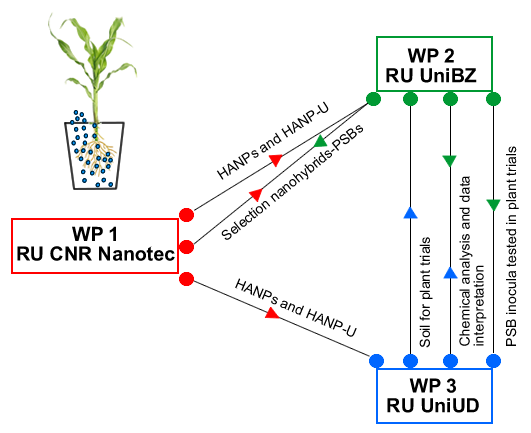
Work packages
CLEOPATRA is oriented towards the development of new fertilization strategies for crops based on nHAP produced from organic waste and functionalized with urea.
In principle, studies on the relationships between plants and engineered nanomaterials require the availability of advanced analytical and instrumental resources and multidisciplinary skills applied with a multi-scale approach. CLEOPATRA brings together a core of Italian researchers who have already achieved an internationally recognized position in the relationships between engineered nanomaterials and plants.
l progetto è organizzato nei seguenti working packages, suddivisi a loro volta in tasks. La UR responsabile del WP è indicata tra parentesi.
WP 1 - nHAP characterization and properties of derived N-nanohybrids (CNR Nanotec)
WP 3 - Efficiency of N-nanohybrids vs conventional N fertilizer (UniUD)
WP 4 - Dissemination (UniUD, UniBZ, CNR Nanotec)

Integration and collaboration between RUs
The specific expertise and competencies of the RUs participating in CLEOPATRA are the prerequisite for the multidisciplinary character foreseen in the scientific approach applied to reach fixed goals. The figure on the left showcases the arrangement of experimental activities. In brackets the RU responsible for the WP.
In particular, CNR Nanotec will be a prerequisite for developing the entire project since they will produce and supply the other partners with the nanomaterials applied for plant studies.
The RU UniBz will cooperate with CNR Nanotech for the selection of nanohybrids-P solubilizing bacteria to be characterized for the potential release of P. RU UniBZ will also be in charge of the preparation of PSB inocula, RU UniUD will test that within the greenhouse trials. In addition, the knowledge acquired during the experiments carried out by RU UniBz will be applied to the greenhouse experiments led by RU UniUD and for the interpretation of data.
RU UniUD will be in charge of project coordination and supervising the partners' activities. In addition, this RU will set up greenhouse trials to assess the effectiveness of the planned fertilization practices, thus also requiring expertise and close interaction with both RU CNR Nanotec and RU UniBZ for the management of the nanomaterials and PSB, respectively. Moreover, soil collected by RU UniUD during pot experiments will be analyzed for fertility parameters and microbial community in collaboration with RU UniBZ.
